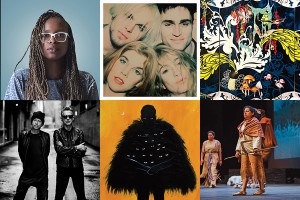Interactive Exhibit ‘Culture Tap’ at BCA Plaza Incorporates CharlieCards into Public Art

Artists Dan Sternof Beyer (left) and Bevan Weissman with one of the kiosks from their “Culture Tap” exhibit on the Boston Center of the Arts Plaza. (Photo by Olga Khvan)
Thanks to “Culture Tap,” an interactive art exhibit recently installed at the Boston Center for the Arts, your CharlieCard now not only takes, but also gives.
During the daytime, when activated with the tap of a CharlieCard—free of charge—two kiosks set up on the BCA Plaza in the South End offer audio stories told by people of the neighborhood. When people tap their CharlieCards at night, they trigger environmental lighting displays.
Artists Dan Sternof Beyer and Bevan Weissman—members of the artist collective New American Public Art and recipients of the Public Art Residency at the BCA—hope Culture Tap will foster connections among the public, both to other users and to their surroundings.
“We’re very strong believers that when people are more invested in their surroundings, good things happen—people become a little more friendly and there are all these social exchanges, and they care about the place they live in,” said Weissman. “This is our attempt to enable that. We see these [kiosks] as catalysts for community.”
Because CharlieCards all hold unique radio-frequency identification (RFID) numbers, each one activates a set of three different stories and light shows at each kiosk.
“It enables people to learn and talk to each other and say, ‘I got a really good one. What do you have?’ or if you don’t have a CharlieCard, to ask someone nearby and say, ‘Hey, would you mind tapping that for me?'” said Weissman. “The hardest thing about meeting strangers is that initial interaction, so we see these as icebreakers.”
Sternof Beyer and Weissman went through their own fair share of interacting with strangers while collecting stories for the project. In addition to setting up interviews with prominent South End organizations, they also sparked impromptu conversations with various residents and business owners to fully capture the flavor of the neighborhood.
“Sometimes we’d go into these stores and people were like, ‘You want to record me? No. Get the hell out of here,'” said Weissman. “But sometimes we’d go in and people would open right up, as if they had been sitting there, alone in the store, waiting for someone to come and ask them that specific question.”
Certain people really stood out for the artists. For Weissman, it was the owner of Spectacle, an eyewear store on Tremont Street, who unexpectedly gave the artists an intimate guitar performance and shared the story of his alter ego Leroy Hungwell, the frontman of a band also called Spectacle.
For Sternof Beyer, it was South End resident Bob Beck, who shared anecdotes amassed over his 60 years of living in the neighborhood. The artist recalled choking up when Beck broke down into tears over his inability to sell his house because of all the memories connected to it.
“It was a really powerful interview—just a roller coaster of emotions,” he said.
While the kiosks at the BCA Plaza focus on the South End, Sternof Beyer and Weissman hope to expand the project in the future by installing kiosks in other neighborhoods, as well as incorporating interactive street maps and a “crowd-curated factor,” which would allow people to submit their own stories.
“I would love for one of these to be in every single T station. Everyone’s got a CharlieCard and while you’re waiting around for the T, you may as well spend that time learning about where you are,” said Weissman. “That’s one thing I really like about this project—it’s modular in the sense that it can fit anywhere.”

Tapping the Culture Tap kiosks at night activates different light shows. (Photo by Olga Khvan)
Installing the project in other neighborhoods could also indicate how people engage with public art in different parts of the city. The kiosks at the BCA keep an anonymous record of every time someone taps their CharlieCard, giving the artists a quantitative account of how many people actually interact with their work.
“Having quantitative data for public art is really important moving forward, and that’s something we’re collecting along the way,” said Sternof Beyer. “If we had them throughout the city and compared from kiosk to kiosk how frequently they get used, it’d give an indication of how arts-ready that area is.”
The project also demonstrates how public art and transportation can go hand in hand. The artists received full support from the MBTA while working on it.
“An organization like that can be intimidating to approach and work with, but we want to lay down the groundwork for making that kind of collaboration possible,” said Weissman. “The MBTA apparently has a reputation for not being too responsive, but we’d love to break down that barrier.”
The artists also hope to positively influence the public’s sentiment toward the MBTA.
“I hope people look at their CharlieCard and look at it as more than just a transportation tool. It’s this symbol of Boston—something that Boston transportation got right and works really well,” said Sternof Beyer. “And now, it’s also something that can activate art in their community.”
The artists see interactive art as a way of empowering the public through curiosity.
“Public curiosity is a thermometer of the connectedness of a culture, how comfortable people are with each other,” said Sternof Beyer.
But stirring curiosity is only a part of the goal—rewarding it is another.
“[Curiosity] so often gets stifled, especially in public places like the train or airport, where you may get in trouble if you’re poking around,” said Weissman. “But having these publicly, socially endorsed things opens that up. And that’s important for a healthy culture, too—to have curious people and not be punished for it.”
“Culture Tap” will be on display at the BCA Plaza, 539 Tremont Street, until October 18. For more info, visit bcaonline.org.

